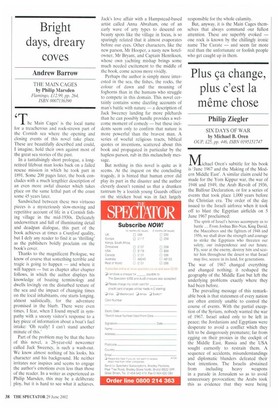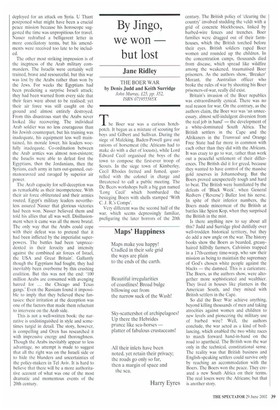Plus ca change, plus c'est la meme chose
Philip Ziegler
SIX DAYS OF WAR by Michael B. Oren OUP, .f25, pp. 446, ISBN 0195151747 Michael Oren's subtitle for his book is 'June 1967 and the Making of the Modern Middle East'. A similar claim could be made for the Yom Kippur war, the war of 1948 and 1949, the Arab Revolt of 1936, the Balfour Declaration, or for a series of events that took place 1,000 years before the Christian era. The order of the day issued to the Israeli airforce when it took off to blast the Egyptian airfields on 5 June 1967 proclaimed:
The spirit of Israel's heroes accompany us to battle ... From Joshua Bin-Nun, King David. the Maccabees and the fighters of 1948 and 1956, we shall draw the strength and courage to strike the Egyptians who threaten our safety, our independence and our future. Fly, soar at the enemy, destroy him arid scatter him throughout the desert so that Israel may live, secure in its land, for generations.
The war of 1967 changed everything and changed nothing; it reshaped the geography of the Middle East but left the underlying problems exactly where they had been before.
The prevailing message of this remarkable book is that statesmen of every nation are often entirely unable to control the course of events. With the partial exception of the Syrians, nobody wanted the war of 1967. Israel asked only to be left in peace; the Jordanians and Egyptians were desperate to avoid a conflict which they felt to be dangerously premature; far from egging on their proxies in the cockpit of the Middle East, Russia and the USA sought earnestly to restrain them. A sequence of accidents, misunderstandings and diplomatic blunders defeated their best intentions. The Israelis abstained from including heavy weapons in a parade in Jerusalem so as to avoid unnecessary provocation; the Arabs took this as evidence that they were being deployed for an attack on Syria. U Thant postponed what might have been a crucial peace mission because his horoscope suggested the time was unpropitious for travel. Nasser redrafted a belligerent letter in more conciliatory terms, but his amendments were received too late to be included.
The other most striking impression is of the ineptness of the Arab military commanders. The Israelis were certainly well trained, brave and resourceful, but this war was lost by the Arabs rather than won by the Jews. For weeks the Egyptians had been predicting a surprise Israeli attack; they had been warned from every side that their fears were about to be realised; yet their air force was still caught on the ground and almost entirely destroyed. From this disastrous start the Arabs never looked like recovering. The individual Arab soldier was no less courageous than his Jewish counterpart, but his training was inadequate, his equipment less well maintained, his morale lower, his leaders woefully inadequate. Co-ordination between the Arab armies was almost non-existent; the Israelis were able to defeat first the Egyptians, then the Jordanians, then the Syrians, each army in turn out-gunned, outmanoeuvred and ravaged by superior air power.
The Arab capacity for self-deception was as remarkable as their incompetence. With their air force obliterated and their armies routed, Egypt's military leaders nevertheless assured Nasser that glorious victories had been won. Nasser believed them and told his allies that all was well. Disillusionment when it came was all the more brutal, The only way that the Arabs could cope with their defeat was to pretend that it had been inflicted by the imperialist superpowers. The battles had been 'unprecedented in their ferocity and intensity against the combined air forces of Israel, the USA and Great Britain'. Gallantly though the Egyptians had fought, they had inevitably been overborne by this crushing coalition. But this was not the end: '100 million Arabs are consumed with avenging hatred for ... the Chicago and Texas gangs.' Even the Russians found it impossible to imply that they believed these fantasies: their irritation at the deception was one of the factors that made them reluctant to intervene on the Arab side.
This is not a well-written book: the narrative is undistinguished in style and sometimes turgid in detail. The story, however, is compelling and Oren has researched it with impressive energy and thoroughness. Though the Arabs inevitably appear to less advantage, no attempt is made to suggest that all the right was on the Israeli side or to hide the blunders and uncertainties of the policy-makers in Tel Aviv. It is hard to believe that there will be a more authoritative account of what was one of the most dramatic and momentous events of the 20th century.



































































 Previous page
Previous page